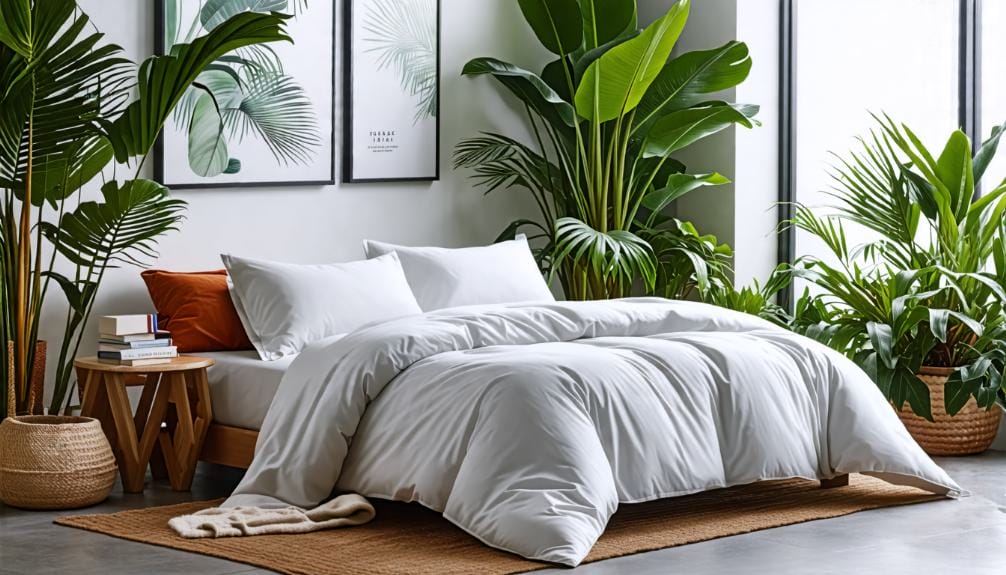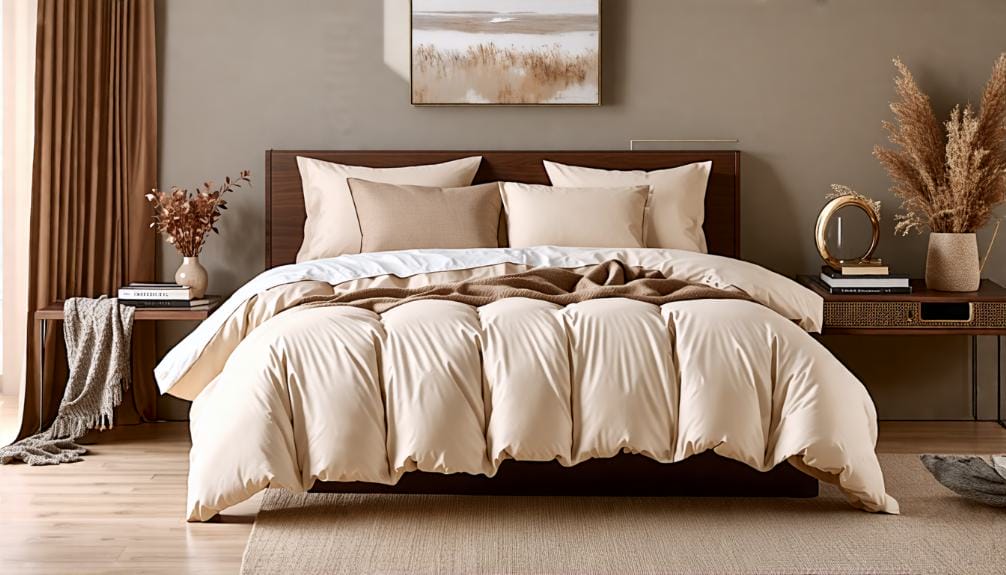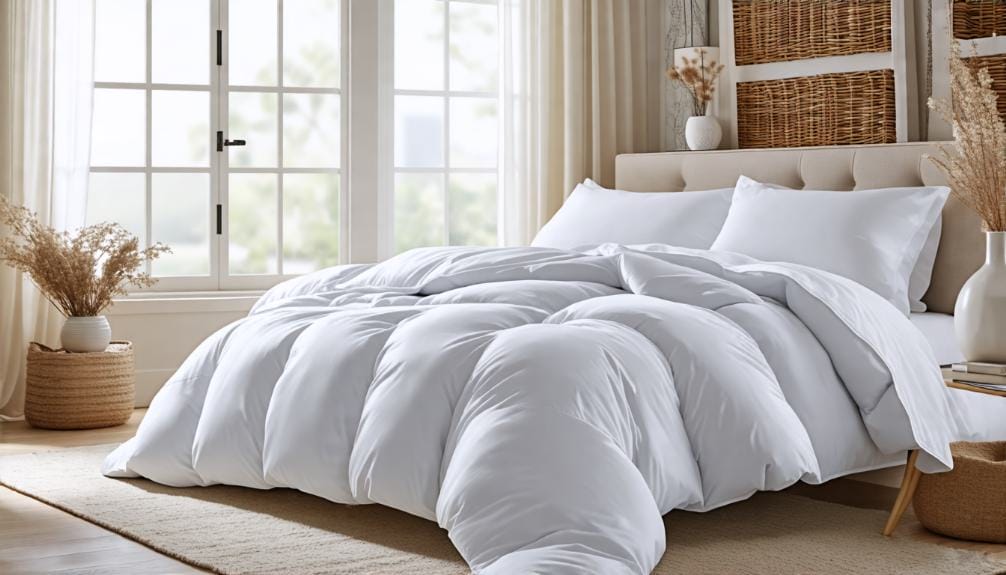Lyocell Vs Polyester Comforter – Which Is Best?
When you are choosing between a lyocell and polyester comforter, it’s important to take into account what matters most to you. Lyocell offers breathability and moisture-wicking properties, making it a strong contender for those who value comfort and sustainability. On the other hand, polyester is known for its durability and affordability, but it might fall short regarding heat retention and breathability. So, how do these factors stack up against each other concerning your sleep quality and environmental impact? The answer might surprise you.
What is Lyocell?

Lyocell is a natural fiber derived from the cellulose of beech wood trees.
Its production process is eco-friendly, making it a sustainable choice.
This material has excellent properties, including breathability and moisture-wicking, which contribute to a comfortable night’s sleep.
Knowing about lyocell helps you recognize its advantages for your next comforter.
Definition
Lyocell is a fabric derived from the cellulose of Beech wood trees, recognized for its softness and breathability. This sustainable material stands out due to its unique fibers that excel in moisture-wicking, making it an ideal choice for hot sleepers. Unlike polyester, which often retains heat and moisture, lyocell promotes air circulation, helping to keep you cool while you sleep.
Key features of lyocell include:
- Sustainability: As a product of renewable resources, lyocell is biodegradable, making it an environmentally responsible option.
- Breathability: The natural fibers enhance airflow, aiding in body temperature regulation for a more comfortable sleep experience.
Opting for lyocell over polyester supports a sustainable lifestyle while also providing a comfortable night’s sleep.
With its superior breathability and moisture-wicking capabilities, lyocell presents a luxurious alternative to synthetic fabrics.
Consider how choosing lyocell for your next comforter not only enhances your sleep quality but also aligns with your commitment to sustainability and comfort.
Production process
The production of lyocell utilizes a closed-loop process that converts cellulose from Beech wood into a soft, sustainable fabric. This method involves harvesting the wood, extracting the cellulose, and dissolving it in a non-toxic solvent.
Unlike polyester, which is made from petroleum-based products, lyocell is derived entirely from natural materials. Once the cellulose is dissolved, the solution is spun into fibers, which are then thoroughly washed and dried. This process significantly reduces waste, making lyocell biodegradable and eco-friendly.
In comparison, polyester production consumes substantial energy and resources, resulting in a greater environmental impact. The synthetic composition of polyester means it doesn’t easily break down, contributing to ongoing waste challenges.
Opting for lyocell means choosing a material that feels luxurious and aligns with eco-friendly principles. Overall, the lyocell production process showcases its sustainable benefits over polyester, demonstrating its ability to lessen environmental harm while offering a comfortable and breathable option for your bedding needs.
Properties
Lyocell is a natural fiber made from Beech wood that’s recognized for its exceptional breathability and moisture-wicking properties, making it an ideal choice for a comfortable night’s sleep. This fiber helps regulate temperature, preventing overheating and creating a more pleasant sleeping environment.
- Breathability: Lyocell promotes airflow, which helps to prevent heat accumulation, keeping you cool throughout the night.
- Moisture-wicking: This fiber effectively draws moisture away from your skin, ensuring you stay dry and comfortable as you sleep.
In contrast, polyester often lacks these desirable features, resulting in a less comfortable sleep experience due to inadequate breathability and moisture control. While polyester options may be durable and budget-friendly, they don’t provide the same level of comfort that lyocell offers.
Choosing a lyocell comforter not only enhances your sleep quality but also aligns with sustainable living practices. For those who value a restful sleep environment and wish to make environmentally conscious choices, opting for a lyocell comforter is a practical decision.
What is Polyester?
Polyester is a synthetic fiber made from petrochemicals through a process called polymerization.
This material is known for its durability and wrinkle resistance, but it typically lacks breathability, which can be a concern for bedding.
Learning about how polyester is made and its properties can help you determine if it meets your comfort needs.
Definition
Polyester, a synthetic fiber derived from petroleum products, is widely recognized for its strength and durability. This makes it a popular choice for comforters, especially for those looking for budget-friendly options. However, polyester often lacks breathability, which can impact your comfort level, particularly if you tend to sleep hot.
Here are some important aspects of polyester:
- Durability: Known for its resilience, polyester is built to withstand daily wear and tear, making it suitable for regular use.
- Maintenance: It’s machine washable and dries quickly, making care and upkeep straightforward.
Despite its practical benefits, polyester raises concerns regarding environmental sustainability. Unlike lyocell, which is biodegradable and sourced from renewable materials, polyester contributes to ecological issues due to its petroleum origins.
While polyester offers durability and low maintenance, it may sacrifice breathability and comfort. For those who prioritize eco-friendliness and a natural texture, exploring options like lyocell could be worthwhile. Recognizing these differences helps align your choices with your values and sleep preferences.
Production process
The production of polyester is a process that combines purified terephthalic acid (PTA) and ethylene glycol through a chemical reaction known as esterification. This reaction produces a durable synthetic fiber that’s strong and versatile.
It’s important to note that polyester is entirely synthetic, unlike lyocell, which is made from biodegradable cellulose sourced from Beech wood. This distinction raises concerns about polyester’s sustainability.
In the polyester manufacturing process, PTA and ethylene glycol are heated together, which causes them to form long polymer chains. This results in a fiber that’s resilient and can endure significant wear. However, polyester isn’t easily biodegradable, which can lead to environmental challenges related to waste management and pollution.
On the other hand, the production of lyocell emphasizes sustainability. It involves converting cellulose into fiber through a closed-loop system that minimizes waste and utilizes non-toxic solvents. As a result, lyocell is biodegradable and poses less harm to the environment, making it a more eco-conscious choice.
Understanding these production methods is crucial for making informed decisions about bedding materials. If sustainability matters to you, opting for lyocell may align better with your values compared to the synthetic nature of polyester.
Properties
Polyester is a widely used synthetic fiber known for its strength and adaptability, making it a common choice for comforters and other bedding products.
Its durability means it can handle everyday wear and tear, which makes it a cost-effective option for consumers. However, it’s important to note that polyester has limitations in breathability and moisture-wicking properties, which can affect sleep quality.
Here are some important properties of polyester to consider:
- Durability: Polyester is resistant to fading, wrinkling, and shrinking, ensuring that your bedding remains in good condition over time.
- Moisture Resistance: Although not as effective as materials like lyocell, polyester does offer some moisture-wicking capabilities, helping to keep you reasonably dry during the night.
On the downside, polyester isn’t environmentally friendly like lyocell. Its synthetic nature raises environmental concerns, particularly when compared to lyocell’s biodegradable properties.
Therefore, if you value breathability and sustainability in your bedding, lyocell may be a better option. However, for those prioritizing durability and cost, polyester remains a practical choice.
How do they compare in comfort?

For comfort, breathability, softness, and moisture-wicking abilities are key.
Lyocell is softer and more breathable, making it ideal if you tend to sleep hot.
Polyester, on the other hand, can keep you warm but may trap heat, which could lead to a less comfortable sleeping experience.
Breathability
Breathability is crucial for a comfortable night’s sleep, and lyocell stands out in this regard. It allows air to circulate freely, helping to keep you cool and comfortable throughout the night. Its moisture-wicking abilities draw sweat away from your body, making it an ideal option for those who tend to overheat while sleeping.
In contrast, polyester often falls short in this area. While it’s durable, polyester tends to trap heat and moisture, which can create a stuffy sleeping environment.
Here’s a breakdown of the differences:
- Lyocell’s breathability: Promotes airflow, helping to regulate your temperature during the night.
- Moisture-wicking: Lyocell pulls moisture away from your skin, contributing to a more comfortable sleep.
For those in search of a comforter that regulates temperature and keeps you dry, lyocell is the superior choice. Its natural fibers create a more enjoyable sleep experience, especially for individuals sensitive to heat.
While polyester may be more affordable, the sacrifice in breathability could lead to discomfort, particularly in warmer weather. Ultimately, your decision should reflect your priorities in creating an ideal sleep environment.
Softness
Lyocell is known for its silky, luxurious texture that provides a comfortable experience. This material wraps you in softness, making it a preferred option for those looking for a cozy sleep environment. The gentle feel of lyocell against your skin creates an inviting atmosphere, transforming your bedtime routine into a relaxing experience. When you slip under a lyocell comforter, it feels like a warm embrace, significantly contributing to a good night’s rest.
On the other hand, polyester tends to be less soft and more rigid. While it may offer durability and affordability, the texture often feels synthetic, which can detract from comfort levels.
Polyester is less effective in breathability compared to lyocell, which can result in an uncomfortable sleeping experience, especially for those who tend to feel warm at night.
Moisture-wicking abilities
Lyocell is renowned for its exceptional moisture-wicking properties, keeping you dry and comfortable throughout the night. Unlike polyester, which often struggles with heat retention and humidity control, lyocell is designed to address these issues effectively. If you’re prone to waking up sweaty, you’ll appreciate how lyocell allows for better airflow and moisture absorption, promoting a more stable body temperature.
Here are key aspects to consider regarding moisture-wicking performance:
- Natural vs. Synthetic: Lyocell, a natural fiber, excels in moisture absorption and evaporation compared to synthetic materials like polyester.
- Comfort Level: A comforter made from lyocell prevents the accumulation of dampness, contributing to a more restful sleep experience.
On the other hand, polyester comforters often trap heat and moisture, resulting in an uncomfortable sleeping environment. Although they may be low-maintenance, their lack of breathability can lead to a clammy feeling, especially in warmer conditions.
For those who value effective moisture-wicking fabrics for a better night’s sleep, lyocell stands out as the superior choice over polyester.
What are their environmental impacts?
Consider the environmental impacts of different materials.
Lyocell is biodegradable and produced with fewer harmful chemicals, making it a more eco-friendly option.
In contrast, polyester is synthetic, which raises concerns about its long-term sustainability and the chemicals used in its production.
Sustainability
When deciding between lyocell and polyester comforters, the environmental impact is a crucial factor. Lyocell stands out as the more sustainable choice. It’s made from wood pulp sourced from responsibly managed forests and is biodegradable, meaning it breaks down naturally and poses less risk to the environment. On the other hand, polyester is a synthetic fabric derived from petroleum, which raises significant sustainability concerns.
Consider these important points about sustainability:
- Resource Efficiency: The production process for lyocell requires significantly less water and energy than that of polyester, making it a more environmentally friendly option.
- Waste Management: Lyocell has a lower environmental footprint since it decomposes easily in landfills, thus contributing to reduced long-term waste accumulation.
Biodegradability
Lyocell is significantly more biodegradable than polyester. While lyocell decomposes naturally in the environment, polyester can take hundreds of years to break down.
Opting for a lyocell comforter means choosing an environmentally friendly option that supports sustainability. Once it reaches the end of its life, it won’t remain in landfills, leaching harmful chemicals into the ecosystem.
On the other hand, polyester, a synthetic material, presents serious environmental challenges. It takes a lengthy time to decompose, contributing to increased waste and pollution.
The production and disposal of polyester comforters are linked to the rise of microplastics in our oceans, which threaten marine life and ecosystems.
Production chemicals
Lyocell production stands out for its lower environmental impact compared to polyester. This cellulosic fiber is made through a closed-loop process that effectively recycles water and solvents, which helps minimize waste and harmful emissions. This sustainable approach makes lyocell an appealing option for those who prioritize eco-friendliness.
On the other hand, polyester is derived from petrochemicals, a process that often results in the release of toxic byproducts. These substances can severely affect air and water quality, contributing to lasting ecological harm.
Here are key considerations for your decision:
- Reduced Emissions: The lyocell manufacturing process generates fewer greenhouse gases, playing a role in protecting the environment.
- Safer Chemicals: The use of less harmful substances in lyocell production lowers the risk of exposure to dangerous chemicals, which is a concern with synthetic fibers like polyester.
Ultimately, the decision between lyocell and polyester extends beyond comfort. It reflects your values regarding environmental preservation and the type of chemicals you endorse through your purchasing choices.
Which is better for allergies?

For allergies, lyocell is a better option due to its hypoallergenic properties and resistance to dust mites.
If you have skin sensitivities or are prone to allergies, using lyocell can lead to a more comfortable sleep experience.
Polyester, on the other hand, may trigger allergic reactions, making it less suitable for those with allergies.
Hypoallergenic properties
Choosing between lyocell and polyester comforters is crucial for individuals with allergies. Lyocell offers hypoallergenic advantages that can make a significant difference for those with sensitivities. Made from sustainable Beech wood, lyocell isn’t only soft but also effectively repels allergens, providing a healthier sleep environment.
On the other hand, polyester, being a synthetic material, may irritate sensitive skin and provoke allergic reactions.
Consider these important factors:
- Hypoallergenic Properties: Lyocell naturally wards off dust mites and common allergens, making it a smart option for allergy sufferers.
- Moisture Control: Lyocell’s ability to wick moisture helps keep your body temperature regulated, which can minimize night sweats and improve comfort for those with allergies.
Dust mite resistance
Lyocell is highly effective in resisting dust mites, making it an excellent option for allergy sufferers. If you are prone to dust mite allergies, lyocell sheets and comforters offer natural hypoallergenic properties. This means they repel allergens and contribute to a healthier sleeping environment. In contrast, polyester is not as effective in this area. Synthetic materials like polyester create a favorable habitat for dust mites, which can worsen allergic reactions.
Here’s a straightforward comparison of the two materials:
| Feature | Lyocell | Polyester |
|---|---|---|
| Dust Mite Resistance | High | Low |
| Hypoallergenic | Yes | Often No |
| Breathability | Excellent | Moderate |
| Moisture Wicking | Superior | Poor |
Opting for lyocell can significantly lower the chances of dust mite-related allergies. While polyester may be more affordable, it does not offer the same protective benefits. Choosing lyocell not only improves comfort but also supports a healthier sleep atmosphere, which is crucial for individuals with allergies.
Skin sensitivity
For individuals with sensitive skin or allergies, lyocell is a preferable alternative to polyester. Its soft and breathable nature helps minimize the likelihood of skin irritation and discomfort. This hypoallergenic material is particularly beneficial for those who require special consideration while sleeping, allowing for a more peaceful night without the fear of allergic reactions.
Here are several practical advantages of opting for lyocell instead of polyester:
- Hypoallergenic features: Lyocell naturally repels dust mites and allergens, contributing to a more comfortable breathing experience while you rest.
- Moisture management: This fabric effectively wicks away sweat, keeping your skin dry and comfortable throughout the night.
While polyester offers durability and a lower price point, its synthetic composition can trap heat and moisture, which may worsen skin sensitivities.
Lyocell strikes a balance between comfort and defense, promoting a refreshed morning free from irritation. For those dealing with allergies or skin issues, lyocell clearly presents a superior choice.
Frequently Asked Questions
How Do Lyocell and Polyester Affect Sleep Temperature Regulation?
Lyocell’s breathable nature helps you stay cool by wicking moisture away, keeping you comfortable throughout the night. In contrast, polyester can trap heat, potentially leading to a restless sleep if you tend to overheat.
Can Lyocell and Polyester Be Machine Washed?
Yes, you can machine wash both lyocell and polyester comforters. Just follow care instructions; usually, gentle cycles and cold water work best. Avoid bleach, and tumble dry on low to maintain their quality.
What Is the Cost Difference Between Lyocell and Polyester Comforters?
When comparing costs, lyocell comforters typically range higher due to their natural fibers and eco-friendly production. Polyester options are generally more affordable, making them a popular choice for budget-conscious shoppers. Your budget will guide your decision.
How Long Do Lyocell and Polyester Comforters Typically Last?
Lyocell comforters usually last around 5-7 years, while polyester ones can endure up to 10 years. With proper care, you can maximize the lifespan of either choice, ensuring long-lasting comfort for your sleep environment.
Are There Any Specific Care Instructions for Lyocell and Polyester Comforters?
When caring for your comforter, follow the manufacturer’s instructions. Typically, lyocell needs gentle washing and low heat drying, while polyester can withstand regular machine washes. Always avoid bleach to maintain fabric integrity and longevity.
In Conclusion
In the battle of lyocell vs. polyester comforters, lyocell clearly stands out as the better choice.
Its breathability, moisture-wicking abilities, and hypoallergenic qualities make it perfect for your comfort, especially if you have sensitive skin or tend to overheat at night.
Plus, its eco-friendly production and biodegradability align with a sustainable lifestyle.
If you’re looking for a cozy, responsible option, you can’t go wrong with a lyocell comforter.
Sleep soundly knowing you made the right choice!
